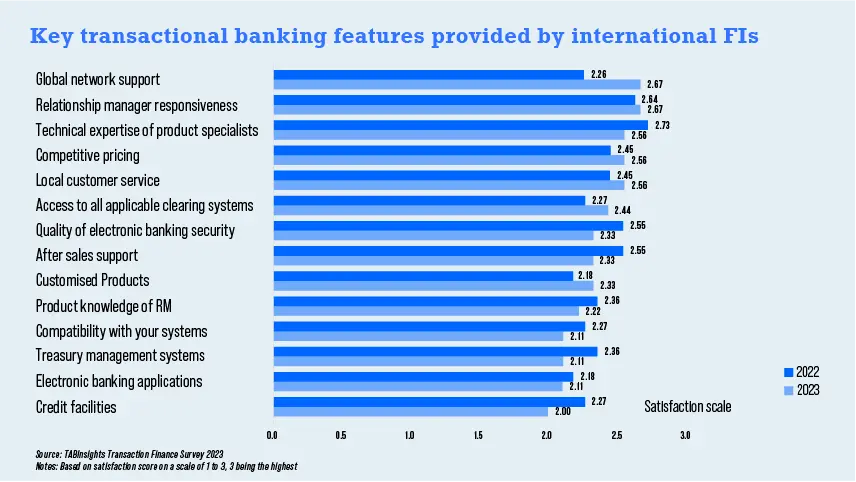At the Sibos annual conference for the financial services community in Toronto this week, discussions focused on the industry’s challenges. From sustainability to inclusivity, deciding whether to manage financial or reputational risk in times of economic distress and geopolitical uncertainty, or to achieve a balance around trust, regulation and technology, the consensus rested on collaboration. It’s becoming evident that there is no single answer, and that digitalisation is not a panacea. Working together across the fragmented financial ecosystem will help solve both existing and upcoming challenges.
TABInsights’ 2023 Asia Pacific Financial Institutions (FI) Satisfaction Survey identifies key global transaction banking players in Asia Pacific that serve regional and domestic banks. The survey results are based on various parameters including strength of overall transaction banking relationships, gauging satisfaction levels with FI services, and discerning the most important features that guide banks in selecting their FI partners. TABInsights placed emphasis on the latter aspect which is deemed by FI as the most important one.
The survey revealed that global network support was the top consideration for domestic and regional banks when choosing their partner for institutional cash management and trade solutions. Respondents also placed tremendous emphasis on technology and product development through collaboration with clients. In line with Sibos’s theme for the year, Collaborative finance in a fragmented world, the survey results attribute global network support as the preeminent force behind collaborative finance.

The survey’s ranking based on the strength of features serves as a comprehensive measure, explaining the importance of product attributes or solutions provided by international transaction banks, as evaluated by domestic banks. It is based on how often regional and domestic banks ranked each characteristic. To derive the strength ranking, a score was assigned with three being the highest and one the lowest. The scores were accumulated to determine the final strength.
On corporate expansion, small and medium enterprises and multinational company customers are venturing into foreign markets due to shifts in supply chains, with domestic banks strongly considering strong global network support and swift relationship manager response before deciding to partner with a global transaction FI.
The long-standing global ambition for a payments ecosystem centred on frictionless cross-border payments will only inch closer to realisation if global systems collaborate as a unified network. The transition to ISO 20022 payment messaging standards to accelerate interoperability is one move towards this goal.
Other key features such as competitive pricing moved up by three ranks in the current survey as customers become more cost conscious in the competitive fintech environment. As in the previous survey, banks selected the technical expertise of product specialists and after-sales support as the top features.
This, together with competitive pricing, and local, round-the-clock support were selected as the third set of primary features with a satisfaction score of 2.5/3.0. Global businesses increasingly demand that financial service providers make cross-border payments instant, secure and transparent. Customers also demand real-time visibility of forex rates directly from their correspondent banking service providers in order to manage currency exposure and mitigate risks across their clients’ global accounts.
Economic sanctions have made correspondent banking more expensive as only a few US banks offer services in USD. Banks have also dropped customers who are less profitable and riskier for sanctions, making the costs of having a correspondent service a major factor.
Click here to download the full TABInsights Financial Institutions Satisfaction Survey Report

































